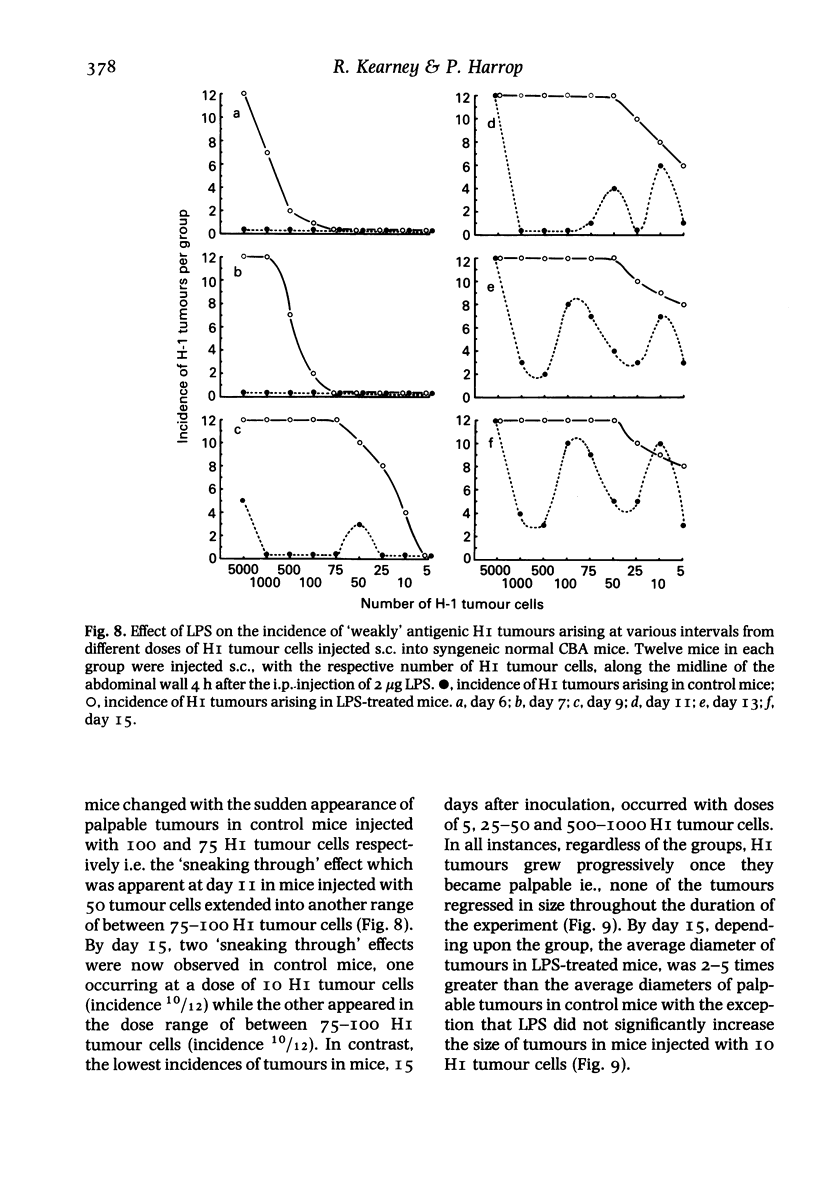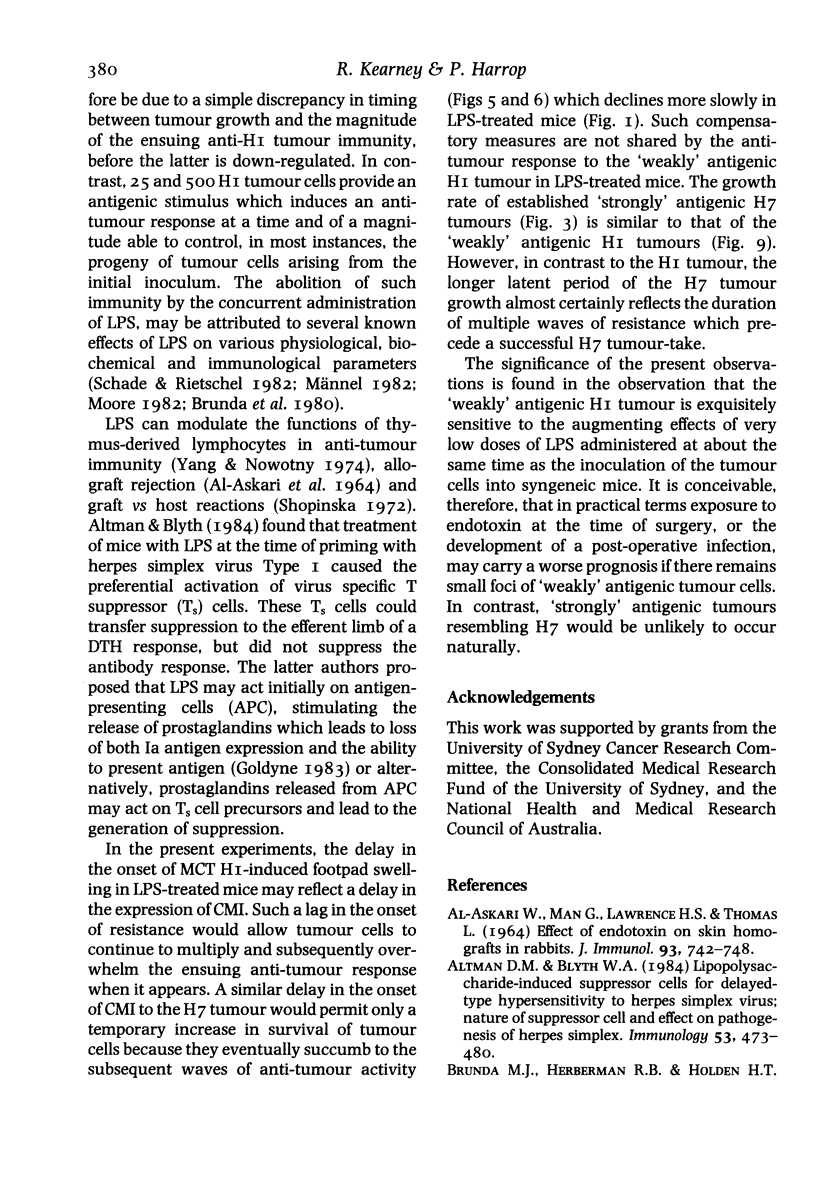Abstract
Studies were undertaken to determine the influence of E. coli lipopolysaccharide (LPS) on the growth of various doses of two antigenically-distinct syngeneic murine fibrosarcomas designated H1 and H7. The 'weakly' antigenic H1 tumour injected subcutaneously (s.c.) along the abdominal wall was profoundly susceptible to the growth-potentiating effects of a single intraperitoneal (i.p.) injection of 2 micrograms LPS, administered concurrently. 'Sneaking through' effects in control mice were observed with doses of 10 and 100 H1 tumour cells. Rejection of medium-sized inocula 25 or 500 H1 tumour cells were abolished by the administration of LPS. In contrast, the 'strongly' antigenic H7 tumour did not exhibit the 'sneaking through' phenomenon and its growth was only temporarily affected by LPS. Studies were also performed to determine the effect of LPS on the kinetics of delayed-type hypersensitivity (DTH) induced by mitomycin C-treated (MCT) H1 or H7 tumour cells inoculated s.c. into the footpads of mice. The 'strongly' antigenic MCT H7 tumour cells induced consecutive waves of footpad swelling of diminishing intensity and corresponded to periods of anti-tumour resistance. The specific phase of MCT H7-induced footpad swelling, maximal at day 6, was delayed in its induction if LPS was administered concurrently with MCT H7 tumour cells. In contrast, the 'weakly' antigenic MCT H1 tumour cells induced only one specific phase of footpad swelling which was rapidly down-regulated. The induction of immunity by MCT H1 tumour cells was also delayed by the concomitant administration of LPS. Because the 'weakly' antigenic H1 tumour was unable to sustain consecutive waves of anti-tumour immunity, the delay in the expression of such immunity by LPS allowed the H1 tumour cells to multiply to eventually overwhelm a rapidly down-regulated immune response. In contrast, the incidence of tumours arising from the 'strongly' antigenic H7 tumour cells was not significantly affected in LPS-treated mice because the tumour cells which escaped the first encounter with delayed anti-tumour immunity, succumbed to subsequent waves of resistance in both normal and LPS-treated mice injected with fewer than 1 X 10(5) H7 tumour cells.
Full text
PDF










Selected References
These references are in PubMed. This may not be the complete list of references from this article.
- Hopper K. E., Harrison J., Nelson D. S. Partial characterization of anti-tumor effector macrophages in the peritoneal cavities of concomitantly immune mice and mice injected with macrophage-stimulating agents. J Reticuloendothel Soc. 1979 Sep;26(3):259–271. [PubMed] [Google Scholar]
- Kearney R., Harrop P. Modulation of anti-tumour immunity induced by syngeneic mitomycin C-treated murine tumour cells. Int J Cancer. 1984 Aug 15;34(2):255–261. doi: 10.1002/ijc.2910340218. [DOI] [PubMed] [Google Scholar]
- Klein G. Recent trends in tumor immunology. Isr J Med Sci. 1966 Mar-Apr;2(2):135–142. [PubMed] [Google Scholar]
- Moore R. N. Regulation of macrophage accessory functions by interactions involving lymphokines and endotoxin. Klin Wochenschr. 1982 Jul 15;60(14):754–755. doi: 10.1007/BF01716572. [DOI] [PubMed] [Google Scholar]
- Männel D. N. Possible role of endotoxin in mediating host resistance. Klin Wochenschr. 1982 Jul 15;60(14):752–753. doi: 10.1007/BF01716571. [DOI] [PubMed] [Google Scholar]
- Schade U., Rietschel E. T. The role of prostaglandins in endotoxic activities. Klin Wochenschr. 1982 Jul 15;60(14):743–745. doi: 10.1007/BF01716568. [DOI] [PubMed] [Google Scholar]
- Skopińska E. Some effects of Escherichia coli endotoxin on the graft-versus-host reaction in mice. Transplantation. 1972 Oct;14(4):432–437. [PubMed] [Google Scholar]
- Wu R. L., Kearney R. Specific tumor immunity induced with mitomycin C-treated syngeneic tumor cells (MCT). Effects of carrageenan and trypan blue on MCT-induced immunity in mice. J Natl Cancer Inst. 1980 Jan;64(1):81–87. [PubMed] [Google Scholar]


